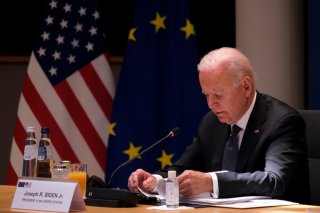President Biden Is Failing to Secure Our Critical Supply Chains
The White House forgets our greatest economic vulnerability: our supply chains’ deep dependence on a regime that wants to weaken and ultimately overtake the United States.
Last year, with heavy earthmoving equipment behind him, President Joe Biden proclaimed, “The future of the chip industry is going to be made in America.” His aspirational rhetoric was equal parts political opportunism and wishful thinking, fueled by the passage of the CHIPS and Science Act, which authorized $53 billion in incentives for U.S. semiconductor manufacturing.
Perhaps there was reason for optimism. The president delivered his speech as Intel Corp. broke ground in rural New Albany, Ohio for a $20 billion chip fabrication plant. The construction alone would create 7,000 jobs, while the new “fabs” would employ 3,000 workers, each earning an average of $135,000 per year. But that happy day was not the end of the story; it was just the beginning.
Ten months later, just before Independence Day, the Chinese Communist Party struck back against U.S. industrial policy by announcing new export controls on gallium and germanium, set to take effect on August 1. These minerals are critical components in a host of advanced technologies, including semiconductors. Moreover, China corners the market on them. Business insiders don’t hesitate to say that Beijing’s export controls “will have an immediate ripple effect on the semiconductor industry.”
So much for that speech on the construction lot. When President Biden bragged about America’s economic future, it seems he forgot our greatest economic vulnerability: our supply chains’ deep dependence on a regime that wants to weaken and ultimately overtake the United States. This is unsurprising because the president has a decades-long track record of being wrong about China. Unfortunately, his naiveté—or whatever you want to call not learning a lesson in half a century—is infectious.
In April, when National Security Advisor Jake Sullivan tried to acknowledge the threat of Communist China, he summed up the appropriate response as “protecting our foundational technologies with a small yard and a high fence.” That’s a fun turn of phrase, but small yards with high fences don’t offer much protection if you have to go outside the yard for everything you need to maintain it. That is exactly what’s happening now.
In the case of chips, the Biden team assumed government subsidies and export controls on advanced technology would vault U.S. industry to the top. CHIPS Act subsidies will almost certainly increase our production capacity. But through an insane loophole, companies can also invest in China to build so-called “legacy” chips. The Biden administration’s export controls are similarly weak, allowing companies like Nvidia and Intel to sell China advanced chips to build its artificial intelligence sector. Meanwhile, Beijing’s controls on gallium and germanium show the Chinese Communist Party still wields lots of leverage—and isn’t afraid to use it.
U.S. innovation is important, but innovation alone won’t make our economy less reliant on our adversaries. At this moment, China controls 63 percent of the world’s rare earth minerals and 85 percent of its mineral processing capacity. If Beijing cut us off, as it cut off Japan in 2010, we would be at China’s mercy. All our fancy factories and machines would be useless.
The same dynamic plagues the Biden administration’s “green transition” investments, especially those tied to the Inflation Reduction Act (IRA). President Biden touts this law as an industrial policy aimed at creating jobs and increasing our economic resilience. Yet there are inherent flaws with the legislation that prevent that from occurring. For instance, because the IRA simply seeks to expand solar power in the United States without addressing Beijing’s grip on global solar panel supply chains, it is actively strengthening that grip, sending obscene quantities of cash to Chinese companies—even ones that profit from Uyghur slave labor.
These missteps squander public trust. If we aren’t careful, they will destroy people’s faith in our ability to rebuild and reindustrialize our economy. That would be tragic because there’s a lot we can do to make America a manufacturing power again. And if we fail, the consequences for our national security will be dire. After all, gallium and germanium aren’t just essential to semiconductor manufacturing—they are also key components in weapon systems. Why would China’s communist overlords grant U.S. defense contractors access to these minerals in the event of a military standoff? They probably won’t. This should serve as a wake-up call to Washington and our defense contractors—some of which, like Raytheon, are naively hoping China will play nice.
What’s more, export controls on a handful of critical minerals barely scratch the surface of China’s economic leverage. Imagine the havoc Beijing could wreak by depriving America of pharmaceutical ingredients or the $100 billion’s worth of electrical machinery we import every year. The United States will not be safe until we act to eliminate these vulnerabilities.
To do so effectively, the Biden administration must move beyond end product-focused projects and begin securing critical supply chains from start to finish. Undeniably, this will be more difficult than throwing money at companies compromised by China. Nevertheless, it is what the American people need and deserve if they are to remain free and prosperous throughout the twenty-first century.
Marco Rubio is the senior U.S. senator from Florida. He is also the vice chairman of the Senate Intelligence Committee and a member of the Senate Foreign Relations Committee.
Image: Shutterstock.

